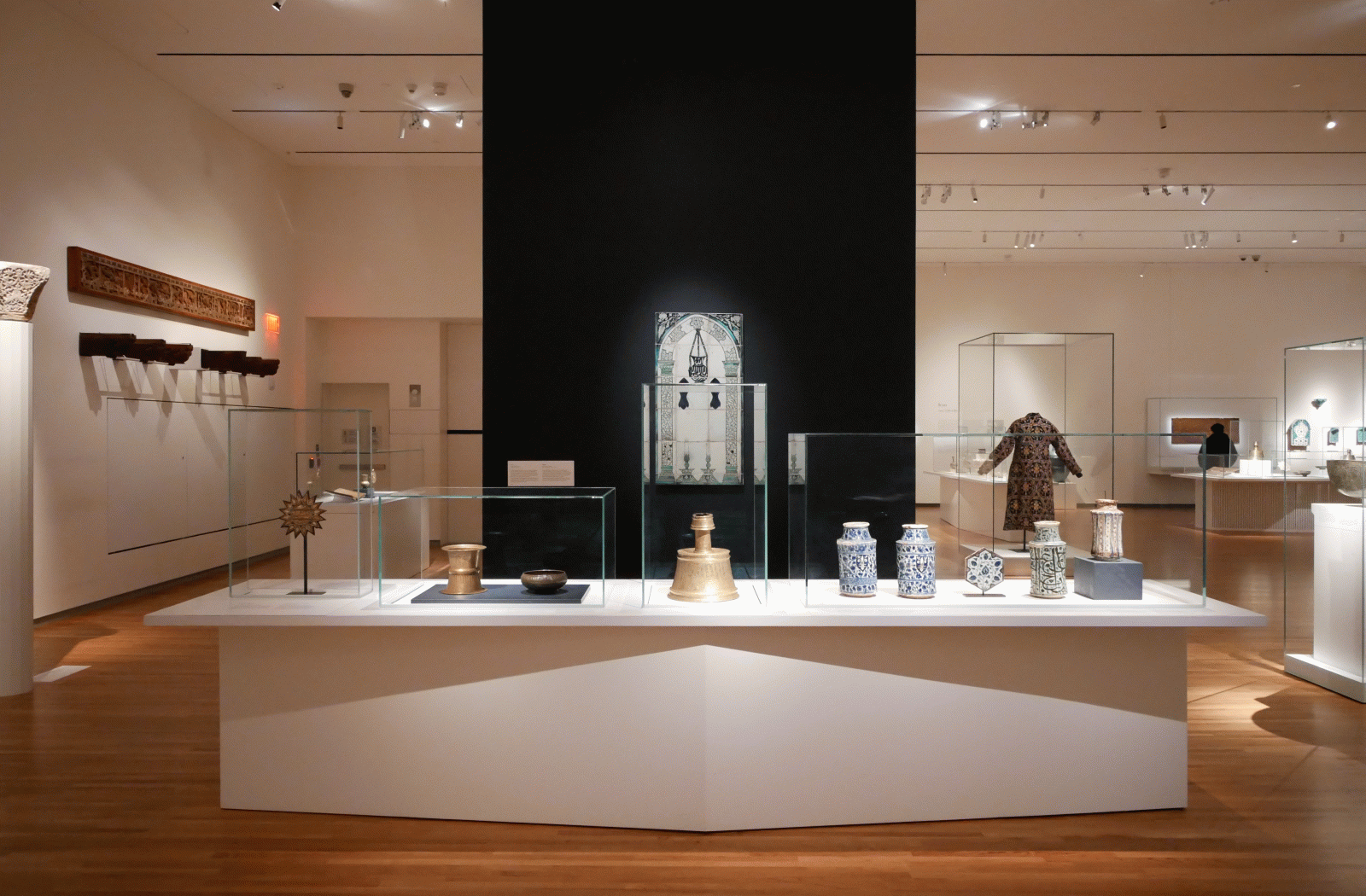4A Lab Seminar
Philip Geisler: Art, Islam, and the Politics of Museum Display at Toronto’s Aga Khan Museum and Granada’s Museo de la Alhambra

Display of Islamic art in the Collections Gallery at the Aga Khan Museum, Toronto. Photo: Philip Geisler, 2020.
Since the early 2000s, numerous museums around the world have reinstalled their collections of Islamic art or created entire new exhibition spaces for the arts and cultures of the Islamic world. During the same period, methodological interventions building on post-structuralist and post-colonial theory have begun to challenge long-standing formal and regional categories defining the field of Islamic art history, and have impacted the display strategies in new exhibits of Islamic art. The approaches these museums adopt to mediate between art, material culture, and Islamic or regional cultures play a central role in shaping discussions about the vast world region that museums associate with Islamic art. At the same time, Islamic art displays are also embedded in heterogeneous local politics and social discourses that serve regional up to national agendas. In theorizing urban architectural arrangements, object displays, and the novel inclusion of performing and contemporary arts, this paper assesses the shifts in early twenty-first-century museum making through the example of European and North American institutions that are distinct from the large universal museums.
In particular, the paper examines object displays at the public Museo de la Alhambra in Granada, Spain, and the private Aga Khan Museum in Toronto, Canada. Philip Geisler suggest that these museums are situated in regional frameworks that mobilize relationships with Islam as a device to construct identity-driven stories for the present moment. Although driven by differing agendas, both institutions attach their collections to notions of heritage rather than explicitly labeling themselves as museums of Islamic art. The paper interrogates the curatorial strategies recently employed in the two museums’ permanent galleries, which foreground narratives of interconnection between historic cultures through discourses of archaeology, material culture, and regionalized art. On the basis of such larger invocations, the author reads these displays as idealized metaphors—or, more specifically, as mythologies—of their contemporary local environments, marked by globalization and immigration. In accentuating pluralism or convivencia as secularized, ideal analogies for modern audiences, these museums complement the early role of national galleries in helping to sustain Spanish and Canadian configurations of multiculturalism as a driving ideology for the 1990s and early 2000s. The museums’ politics of knowledge thus partake in negotiating the recognition of distinct communities vis-à-vis hegemonic collectives. Philip Geislers paper aims to expand the discussion on the notions of art versus heritage in museum politics and on the role of displays, global art historiography, and architecture as meta-narratives that bear ideological meaning for the configuration of socio-cultural paradigms through the marker of “Islam.”
Philip Geisler is a Ph.D. candidate at the Berlin Graduate School Muslim Cultures and Societies (BGSMCS) and a Doctoral Fellow in the interdisciplinary program 4A Laboratory: Art Histories, Archaeologies, Anthropologies, Aesthetics. He is currently completing his doctoral thesis, titled Art, Islam, and the Politics of Museum Display in the Early Twenty-First Century. His work explores the politics of knowledge and focuses on the discursive use of museum objects and architecture, the performing arts, and art historiography in contemporary cultural debates, constructions of heritage, and configurations of multiculturalism and secularism. Before studying Art History, Islamic Studies, and Political Science at the Freie Universität Berlin and Harvard University, he obtained a degree in Journalism and Media Economics from the Medienakademie Berlin. From 2013 to 2019, he worked at the Forum Transregionale Studien as a member of Art Histories and Aesthetic Practices, a research program in collaboration with the Kunsthistorisches Institut in Florenz – Max-Planck-Institut. Philip Geisler is a recipient of the Ottoman & Turkish Studies Association’s Sydney N. Fisher Prize and is a former fellow of the Studienstiftung des Deutschen Volkes. As a music dramaturg, he co-founded and co-directs the trans-traditional Trickster Orchestra and has worked for the Berlin Philharmonic Orchestra as well as for jazz and contemporary music ensembles within the cosmos of the ECM record label. In his journalistic activities, he hosts discussions on art, literature, and music.
13 giugno 2022, ore 16:30
This event will take place online. If you would like to register to receive the Zoom link, please email 4a_lab@khi.fi.it.
Avviso
Questo evento viene documentato fotograficamente e/o attraverso riprese video. Qualora non dovesse essere d’accordo con l’utilizzo di immagini in cui potrebbe essere riconoscibile, da parte del Kunsthistorisches Institut in Florenz a scopo di documentazione degli eventi e di pubbliche relazioni (p.e. social media) la preghiamo gentilmente di comunicarcelo.


